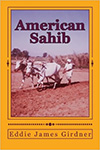Review — AMERICAN SAHIB by Eddie James Girdner (India)
 American Sahib
American Sahib
(novel)
Eddie James Girdner (India 1968–70)
CreateSpace
March 2016
420 pages
$14.90 (paperback)
Reviewed by Tony D’Souza (Ivory Coast 2000-02, Madagascar 2002-03)
•
ONE OF THE GREAT liberties of the on-going tidal wave of self-publishing is that an author can go on as long as he wants. No longer do fussy editors slash and burn their way through your manuscript, no nitpicking gatekeepers naysay your style or plotting, or even the basic value of the endeavor at all. Turn the coin over, however, and the drawbacks are those same things. If engineers were allowed equal liberties, the landscape would be littered with deathtrap bridges. If ballerinas were so free, most would be falling down.
In the back jacket copy to Eddie James Girdner’s overlong and plodding American Sahib, someone has lauded the book as, “The only novel ever written about the American Peace Corps experience in rural Punjab.” Kudos, I suppose, if that is the case. Regardless, the book strays not-at-all from the long familiar Peace Corps novel boilerplate of leaving America, going through training in a strange land, recognizing the folly of trying to get anything done under a smothering foreign bureaucracy, hating all the foreigners for awhile, then loving them, then going home with a broken heart. The settings change in these books based on where the author served, but the stories don’t. One wonders in reading the same story over and over again if the authors have taken the time to read other Peace Corps books, to see what has already been done, that they might try and offer something — anything —different, even if it is just a tidbit of insight that has not come before.
In American Sahib, young James finishes his undergraduate education in Missouri, where he grew up on a farm, and applies to the Peace Corps to dodge the Vietnam War. He has no great interest in serving in Kennedy’s foreign outreach program other than he’s terrified of catching a bullet in Southeast Asia (perhaps he should have; Vietnam vet contemporaries like Tim O’Brien, Robert Olen Butler and Phillip Caputo turned out a lush canon of literature). Indian cuisine turns James’s stomach at first — that’s how much of a hayseed he is — and he regularly gives us updates about the difficulty and quality of his bowel movements. There is some trouble in finding a home in the village where he is sent to serve and after lodging uncomfortably with a wealthy landowner as an unwelcome guest, he is finally given a room of his own, makes friends among the Punjabis and begins to see the native women as lovely, which surprises him.
One thing I did like about this thinly veiled memoir — Girdner avoids writing dialogue at all costs; most of the novel reads like the summarized daily entries of a journal — is that James does something few other Peace Corps Volunteers then or now have managed, he impresses the locals with his actual farming knowledge. In one interesting scene, he takes the wheel of a tractor on a dare and so impresses the landowner with his expert use of the machine that he’s given rein to plow the whole, broad field. Girdner also writes market and landscape scenes with detail and verve, enough that one wishes more editing had gone into this book, that its strengths could have been drawn out of the chaff.
Ultimately, James is a young man alone in a distant land and we get the inevitable and much welcome sex scenes to break up the monotony of bowel movements and boredom. In the most novelesque elements of the book, James has an on-going affair with a village girl, consummated once in a field, as well as occasional trysts with an American woman, the wife of an ex-pat doing something in the country, though the rough storytelling does not make that part clear. Girdner stakes a lot on his ability to write sex scenes in the book, since there are a lot of them. The following passage, when he hooks up with the American woman once again, is typical of what Girdner has to offer:
“Oh God! Oh God, come on, honey,” Jan said, “You are so good. I want you, James. I want you. Give me more. I want it hard . . .. It has to be hard for a young man out there in those villages,” she said. “You must get horny as hell. Your big balls were full to overflowing. You creamed me so full. Like you had saved up for months.”
She felt of his balls. “These are so nice,” she said . . .
“I am going to fuck you again,” he said. “I want more of your pussy. I love your pussy, Jan, my baby.”
“Take me, take all you want,” she said. “I want it.”
If Girdner’s book is truly the “only novel ever written about the American Peace Corps experience in rural Punjab,” it leaves plenty of room for more. Hopefully the next one will be edited.
•
Eddie James Girdner is a retired professor and the author of fourteen books. He taught political science in the United States, Cyprus and Turkey. After serving in the Peace Corps for two years in Punjab, India, he joined the US Navy and spent four years on a Navy destroyer. He earned a doctorate from the University of California, Santa Barbara. He lives in Izmir and Fethiye, Turkey.
Reviewer Tony D’Souza (Ivory Coast 2000-2002, Madagascar 2002-2003) lives in Florida. He is a contributing editor at Sarasota Magazine and won a few awards.
No comments yet.
Add your comment